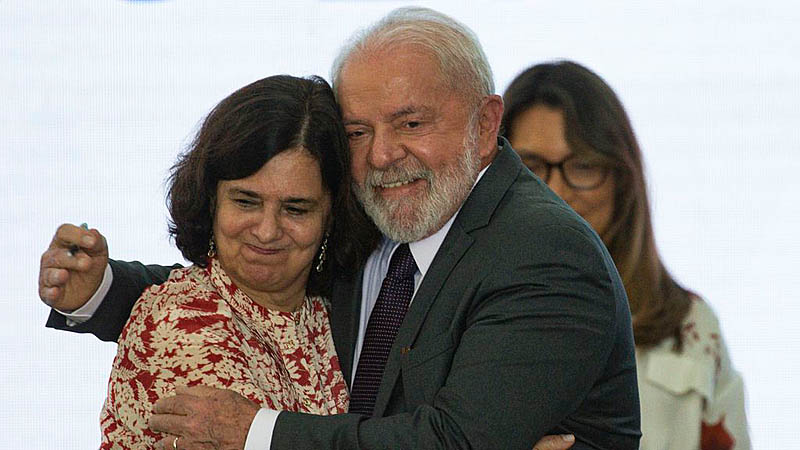Lula government relaunches ‘More Doctors’ program to recruit 15,000 professionals in marginalized areas : Peoples Dispatch
Lula and the Minister of Health, Nísia Trindade, during the launching of the program – Marcelo Camargo/Agência Brasil
The Brazilian government officially launched on Monday, March 20, the new version of the More Doctors (Mais Médicos, in Portuguese) program—now formally called More Doctors for Brazil (Mais Médicos para o Brasil, in Portuguese). There will be 15,000 new vacancies for professionals with a degree in Medicine, which should raise the number of people hired by the program to 28,000 by the end of this year.
The hiring will take place mainly to meet the demand in places of extreme poverty. According to government estimates, more than 96 million people will have guaranteed primary care, especially in Basic Health Units, fundamental for disease prevention and damage reduction in serious situations.
Launched in 2013 by then President Dilma Rousseff (Workers’ Party), the program was a historic step in improving healthcare in the country, with the expansion of the availability of professionals. However, the initiative was always criticized by the opposition (which would later come to power under Jair Bolsonaro). In recent years, the program had been weakened. Bolsonaro even launched a supposed alternative, called “Doctors for Brazil”, but it never became a reality.
“Bolsonaro’s government proposal did not guarantee doctors where they were most needed. By the end of 2022, more than 4,000 family health teams were without doctors, the worst scenario in ten years,” said Health Minister Nísia Trindade, at the program launch event on Monday.
Brazilians as priority
Brazilian doctors will have preference in the selection, but foreign professionals with a Health Ministry Registration will also be able to participate. Financial incentives will be offered to professionals who stay at least 36 months in the same municipality. Doctors who have taken the Student Financing Fund (FIES, in the Portuguese acronym) will also receive a bonus for participating in the program.
“The More Doctors came back to answer the challenge of guaranteeing the presence of doctors to Brazilian people in the most distant municipalities and on the outskirts of the big cities, who suffer from lack of access to such an important attention,” said Nísia Trindade.
The federal government will invest R712 million (approximately US$ 136 million) this year. The first public notice of the new program will be issuedin March, with 5,000 vacancies, while another 10,000 vacancies will be opened in the coming months, in what is a partnership between the federal government and the municipalities. The goal is to reduce the hiring costs for the municipalities.
“Only the mayor who wants to hire knows how much a doctor is needed in a town. Sometimes he pays a higher salary than feasible, and still can’t find a doctor who is willing to go to a small town in the countryside, which has no shopping mall, no movie theater,” said President Luiz Inácio Lula da Silva.
The president also said that his first 100 days in office was being used to survey the reality of the country, to discover “the degree of destruction to which the country has been subjected in these last six years.” This Monday, day of the relaunch of More Doctors, is the 80th day of his term.
“In these 80 days of government, we have done nothing but try to recover everything that had been done well, that had worked, and was destroyed. It is as if you came back from vacation and there was an earthquake in your house,” the President said.
“A saúde voltou. O Mais Médicos voltou. E voltaram para ficar”
O governo federal lançou nesta segunda (20) o novo Mais Médicos – agora chamado Mais Médicos para o Brasil. As contratações serão principalmente em locais de extrema pobreza.#BrasildeFato 📲 pic.twitter.com/5IlYQ5fTX6
— Brasil de Fato (@brasildefato) March 20, 2023
Educational opportunities
The new More Doctors program will offer educational opportunities, such as the possibility of pursuing a master’s degree specialization. According to the Ministry of Health, which will work alongside the Ministry of Education in this area, more than 40% of participants drop out of the program to seek training and education.
“Today there is consolidated evidence that the program has managed to provide professionals for the most vulnerable areas, expanded access in family health, reduced hospital admissions and infant mortality. That’s why it’s back,” highlighted the Health Minister.
This article was originally published on Brasil de Fato.
No Byline Policy
Editorial Guidelines
Corrections Policy
Source
